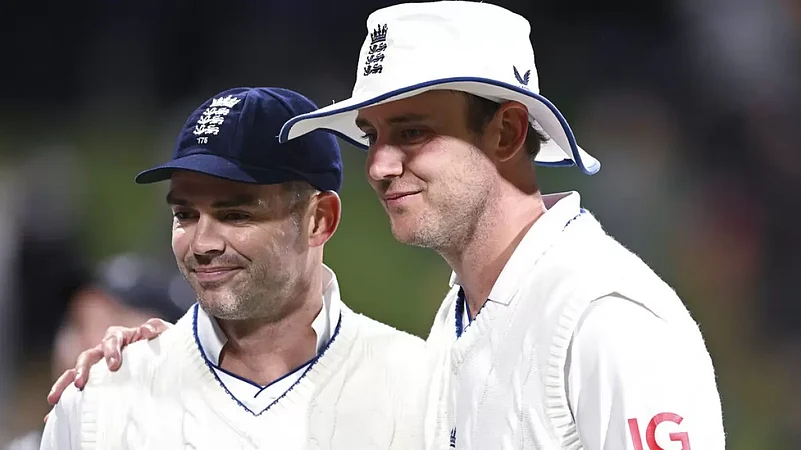For New Zealand, the end at least came quickly. England needed less than a session on the fourth day Sunday to complete a 267-run win in the first day-night cricket test and to take a 1-0 lead in the two-match series. (More Cricket News)
New Zealand Vs England, 1st Test: Stuart Broad, James Anderson Devastate Hosts With 267-Run Win
While Stuart Broad finished with 4-49, his long-time and record-breaking partner James Anderson took 4-18 bowling out the Kiwis for 127 runs.

Stuart Broad, who clean bowled four New Zealand top-order batters late on the third day to leave the home side 63-5 overnight and make the win imminent, finished with 4-49. His long-time and record-breaking partner James Anderson took 4-18, sealing the win when he bowled No. 11 Blair Tickner (8) about 15 minutes before tea as New Zealand was all out for 127.
That raised Anderson and Broad's tally of test wickets in partnership to 1,009 in 103 matches, eclipsing the record of 1,001 previously held by Australians Glenn McGrath and Shane Warne.
England will now take a 1-0 series lead into the second and final test in Wellington from Friday.
“Obviously another great performance. We were very clinical with the bat and obviously very clinical with the ball,” England captain Ben Stokes said.?
“When you've got Stuart Broad and James Anderson in your bowling attack, it's obviously going to be very hard for anyone with a bat in their hand.”
New Zealand had shown some signs of resistance after the collapse of its top order when allrounders Daryl Mitchell and Michael Bracewell stuck together for almost an hour before stumps on day three.
The resistance was broken spinner when Jack Leach removed Bracewell (25) in the third over of the day Sunday and England resumed a rapid push for victory.
Anderson trapped Scott Kuggeleijn lbw next over, then had New Zealand captain Tim Southee caught first ball by Joe Root at slip with his next ball and the England players likely were setting up tee times with the end in sight.
Neil Wagner followed quickly but Mitchell and last man Blair Tickner made England wait a little longer, sticking together for almost 11 overs. Mitchell was able to post his sixth test half-century and he finished unbeaten on 57.
“All credit to England. They strategically played it pretty well,” New Zealand captain Tim Southee said.?
“We were on the receiving end of a couple of night periods which obviously weren't ideal.
“That spell (by Broad) last night was obviously impressive but we knew if we got through last night there would not be many demons in the pitch today. I think it's credit to the way they bowled under lights last night.”
Almost from the first ball of the match the difference between the teams was obvious: England constantly was on the attack, New Zealand constantly was defensive.
Even when it lost the toss, England was determined to go on the offensive and opener Ben Duckett blasted a half-century from 37 balls to put his team on the front foot. New Zealand hung in at times but never gained the upper hand.
England twice routed New Zealand's top order under floodlights when the ball moved around more than in daylight on a relatively docile pitch. That was not by accident but design.
Stokes made the second-earliest first day declaration in test history when he ended his team's first innings at 325-9 almost 90 minutes before stumps. In that period Anderson and Ollie Robinson dismissed Kane Williamson, Tom Latham and Henry Nicholls and left New Zealand 37-3 before it clawed back to 306 with Tom Blundell's 138 on the second day.
England then raced to 374 in its second innings at a one-day international rate of more than five runs an over with half-centuries to Joe Root, Harry Brook and Ben Foakes. England's lead was 393 and the innings ended again in time to send New Zealand in under floodlights for the second time.
This time Broad wrecked the New Zealand top order, bowling Devon Conway, Latham, Williamson and Blundell.
“It was all set up,” Broad said. “The way we set the whole game up, we were building towards knowing we wanted to bowl as much as possible under the lights with the harder pink ball.
“All our conversations through the day were about not so much (about) runs, but the timing of when to bowl, which is a bit weird but that's the day-night system. It's nice to be on that side, and you've got to put a lot of work in to control when you can bowl at the good times.”
That control is the essence of Bazball, the doctrine of Stokes and coach Brendon McCullum. Bazball is mischaracterized when it is portrayed as a policy of attack without restraint or caution. It is about taking control and dictating terms as England did when they were able to cherry pick when they wanted to bowl.
- Previous Story
 Who Is Abhimanyu Easwaran? The Indian Domestic Run-Machine Knocking On The Doors For Australian Tour
Who Is Abhimanyu Easwaran? The Indian Domestic Run-Machine Knocking On The Doors For Australian Tour - Next Story
























